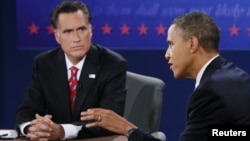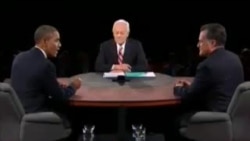Sino-American relations loom large over the U.S. presidency, drawing interest and concern from both the candidates vying for the White House and Chinese-American voters.
Throughout the campaign, the candidates have taken turns criticizing China’s trade practices and frequent disregard for intellectual property rights, casting the Asian powerhouse as the global competitor the United States must beat.
Deborah Wang, a Chinese-American voter, watched this week’s debate concerned that President Barack Obama and his Republican rival, Mitt Romney, would simplify America’s complex relationship with China into what she called a “caricature.”
“I think the campaigns do it because China is an easy target because a lot of Americans don’t understand how complex the situation is. They are very frustrated with the economy at home,” said Wang, who lives in the strategically important state of Ohio.
“It’s very, very easy to point to an external target and blame it on that, and just say ‘I’m going to stand up to this big mean nasty foreign power’ and somehow this is going to ameliorate them. I think it’s disingenuous,” she said.
Growing influence
Wang is among the increasingly important electorate of Asian-Americans - one of the fastest growing populations in the United States and, according to a new survey, one of the most undecided voting blocs in the country.
Karthick Ramakrishnan, who helped conduct the National Asian American Survey, said these voters could make a difference in the November election.
"We found in our most recent data that we collected through the middle of October, more than a quarter of Asian American voters were undecided," he said. "That's about three times higher than the national average."
Ramakrishnan said those who have decided tend to favor the Democratic Party over the Republican Party. Social issues and the economy help inform the votes, he said, but political rhetoric does, too.
"There is a lot of concern in the Asian American community in terms of how U.S. foreign policy is being talked about," he said. "Is it being talked about in a nuanced and complicated way? Or is it being used in a shorthand way that might inflame tensions, not just toward China, but towards Chinese-Americans."
Complex relations
Wang, who is planning to vote for President Obama, said she was pleasantly surprised by Romney’s handling of the China issue during the debate.
"For a second there, I actually felt Romney was making a lot more sense, at least when he started out saying China wants stability in the world," she said. "They don't want war. They want a stable market to which they can export their products. I was nodding my head. I was like yup, that's definitely what China wants."
She was a little less impressed when Romney repeated his pledge to label China a “currency manipulator” to enable the U.S. to apply tariffs where he said China is “taking jobs” from Americans.
“They sort of glossed over the feasibility of making China value its currency to our liking, and they didn’t really go into how consumer good prices would rise in the States if either Chinese goods prices would rise or if we would be forced to consuming more domestically or from other more expensive countries,” she said.
The Obama administration has encouraged China to practice fair trade policies but refrained from accusing the country of manipulating its currency.
Another Chinese-American voter, Raymond Lee, said he worries more about creating jobs and lowering the U.S. debt than how Asian-Americans are perceived because of the so-called China-bashing. The Ohio resident said he supports Romney because he understands the challenges faced by U.S. businesses.
"Similar to Mitt, or Governor Romney, I've seen a lot of different situations advising clients, advising business," said Lee, another Ohio resident. "I had to live through making payroll … We worry about day to day struggles of government regulation. We live with it right now."
Lee, the chief executive officer of a juice company, started humbly, growing up in a poor neighborhood where he says he suffered discrimination from both blacks and whites because he was Asian. He opposes some Obama-administration programs that offer social and education assistance, which Lee said people should find a way to pay for themselves, like he did.
President Obama “talks about supporting today's youth, and today's youth is going to have to figure a way to pay back all this debt. That's the legacy that's going to be left behind,” Lee said. “I find it interesting that Governor Romney has not attacked him harder about supporting the youth and college education.”
It’s the Obama administration’s investment in social services that appeals to voters like Wang, who helps Asian immigrants and refugees in the Cleveland area.
Looking inward
During the debate, the president argued that over the long term, the United States must invest at home in order to compete with China.
"If we don't have the best education system in the world, if we don't continue to put money into research and technology that will allow us to - to create great businesses here in the United States, that's how we lose the competition," Obama said.
The president’s answer was typical of several in Monday night's debate, where questions on foreign policy instead prompted answers on domestic issues. The candidates made no mention of China’s human rights record and only briefly referred to its growing military power, focusing instead on what surveys say is the primary concern of Asian-Americans and all other American voters – the U.S. economy.
Watch the entire third U.S. presidential debate:
Throughout the campaign, the candidates have taken turns criticizing China’s trade practices and frequent disregard for intellectual property rights, casting the Asian powerhouse as the global competitor the United States must beat.
Deborah Wang, a Chinese-American voter, watched this week’s debate concerned that President Barack Obama and his Republican rival, Mitt Romney, would simplify America’s complex relationship with China into what she called a “caricature.”
“I think the campaigns do it because China is an easy target because a lot of Americans don’t understand how complex the situation is. They are very frustrated with the economy at home,” said Wang, who lives in the strategically important state of Ohio.
“It’s very, very easy to point to an external target and blame it on that, and just say ‘I’m going to stand up to this big mean nasty foreign power’ and somehow this is going to ameliorate them. I think it’s disingenuous,” she said.
Growing influence
Wang is among the increasingly important electorate of Asian-Americans - one of the fastest growing populations in the United States and, according to a new survey, one of the most undecided voting blocs in the country.
Karthick Ramakrishnan, who helped conduct the National Asian American Survey, said these voters could make a difference in the November election.
"We found in our most recent data that we collected through the middle of October, more than a quarter of Asian American voters were undecided," he said. "That's about three times higher than the national average."
Ramakrishnan said those who have decided tend to favor the Democratic Party over the Republican Party. Social issues and the economy help inform the votes, he said, but political rhetoric does, too.
"There is a lot of concern in the Asian American community in terms of how U.S. foreign policy is being talked about," he said. "Is it being talked about in a nuanced and complicated way? Or is it being used in a shorthand way that might inflame tensions, not just toward China, but towards Chinese-Americans."
Complex relations
Wang, who is planning to vote for President Obama, said she was pleasantly surprised by Romney’s handling of the China issue during the debate.
"For a second there, I actually felt Romney was making a lot more sense, at least when he started out saying China wants stability in the world," she said. "They don't want war. They want a stable market to which they can export their products. I was nodding my head. I was like yup, that's definitely what China wants."
She was a little less impressed when Romney repeated his pledge to label China a “currency manipulator” to enable the U.S. to apply tariffs where he said China is “taking jobs” from Americans.
“They sort of glossed over the feasibility of making China value its currency to our liking, and they didn’t really go into how consumer good prices would rise in the States if either Chinese goods prices would rise or if we would be forced to consuming more domestically or from other more expensive countries,” she said.
The Obama administration has encouraged China to practice fair trade policies but refrained from accusing the country of manipulating its currency.
Another Chinese-American voter, Raymond Lee, said he worries more about creating jobs and lowering the U.S. debt than how Asian-Americans are perceived because of the so-called China-bashing. The Ohio resident said he supports Romney because he understands the challenges faced by U.S. businesses.
"Similar to Mitt, or Governor Romney, I've seen a lot of different situations advising clients, advising business," said Lee, another Ohio resident. "I had to live through making payroll … We worry about day to day struggles of government regulation. We live with it right now."
Lee, the chief executive officer of a juice company, started humbly, growing up in a poor neighborhood where he says he suffered discrimination from both blacks and whites because he was Asian. He opposes some Obama-administration programs that offer social and education assistance, which Lee said people should find a way to pay for themselves, like he did.
President Obama “talks about supporting today's youth, and today's youth is going to have to figure a way to pay back all this debt. That's the legacy that's going to be left behind,” Lee said. “I find it interesting that Governor Romney has not attacked him harder about supporting the youth and college education.”
It’s the Obama administration’s investment in social services that appeals to voters like Wang, who helps Asian immigrants and refugees in the Cleveland area.
Looking inward
During the debate, the president argued that over the long term, the United States must invest at home in order to compete with China.
"If we don't have the best education system in the world, if we don't continue to put money into research and technology that will allow us to - to create great businesses here in the United States, that's how we lose the competition," Obama said.
The president’s answer was typical of several in Monday night's debate, where questions on foreign policy instead prompted answers on domestic issues. The candidates made no mention of China’s human rights record and only briefly referred to its growing military power, focusing instead on what surveys say is the primary concern of Asian-Americans and all other American voters – the U.S. economy.
Watch the entire third U.S. presidential debate:













